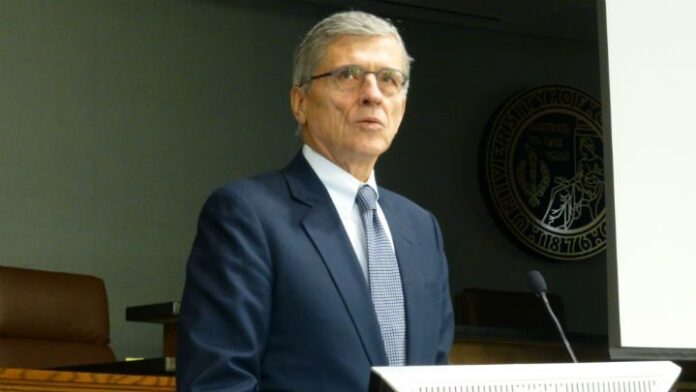FCC Chairman Wheeler’s recent comments on net neutrality hint at Title II
The heated net neutrality debate is set to further intensify as Federal Communications Commission Chairman Tom Wheeler is set to circulate a new proposal on the topic to FCC commissioners on Feb. 5, with an agency vote currently scheduled for Feb. 26.
During the recent Consumer Electronics Show in Las Vegas, Wheeler provided some insight into his planned proposal, though with just enough ambiguity to leave room for plenty of interpretation leading up to its circulation. Many seemed to take Wheeler’s comments as proof that the FCC plans to move broadband regulation under the agency’s Title II provision, which is also used by the government to regulate public utilities.
During a question-and-answer session with Consumer Electronics Association President and CEO Gary Shapiro, Wheeler seemed to list items that would indicate the FCC would indeed push for full Title II regulatory power over broadband services.
“We’re going to propose rules that say that no blocking, no throttling, [no] paid prioritization, all that list of issues, and that there is a yardstick against which behavior should be measured. And that yardstick is ‘just and reasonable,’ ” Wheeler said.
A more significant outcome of Wheeler’s decision were hints that the FCC would also include mobile broadband networks under Title II, which would require those operators to treat data traffic the same way as wired broadband providers. Wheeler cited the 1996 Telecommunications Act, which, while applying Title II to wireless networks the same as wired networks, exempted wireless networks from many of the provisions governing wired networks.
However, with an increasing number of people relying on mobile networks for their Internet access, pressure is mounting to include all access to the Web under a single regulatory framework.
If Wheeler does indeed move to place broadband networks under Title II, it would go against the agency’s 2007 decision that exempted wireless data networks from being considered under Title II.
Wheeler last year seemed to hint that the FCC would go light in terms of regulating broadband networks following an appeals court decision that ruled against the FCC in how it was looking to regulate Verizon Communications’ business model for delivering broadband services. Wheeler had reportedly attempted to broker a decision that would please both broadband providers and public interest groups, but to no avail.
Wheeler’s position on the matter became more tenuous in November when President Barack Obama threw his support behind the FCC moving forward with bringing broadband access under Title II. Wheeler was nominated for his current position by Obama and was part of his initial transition team in 2008.
“We cannot allow Internet service providers to restrict the best access or to pick winners and losers in the online marketplace for services and ideas,” Obama noted in a statement on the issue. “That is why today, I am asking the Federal Communications Commission to answer the call of almost 4 million public comments, and implement the strongest possible rules to protect net neutrality.”
In his comments, Obama laid out what he called “bright-line” rules that he has asked the FCC to integrate into its net neutrality plans. Those include preventing an Internet service provider from blocking any content or “intentionally” manipulating network speeds for accessing content. Obama also called for increased transparency when it comes to interconnection between ISPs and the Internet, noting the FCC should make full use of its transparency authority. In addition, Obama stated the FCC should prevent the implementation of paid prioritization for accessing content or for content to run over a broadband connection.
In his comments, Obama also noted that such regulations should be put in place regardless of the connection method, including wireless, though with a caveat.
“The rules also have to reflect the way people use the Internet today, which increasingly means on a mobile device,” Obama noted. “I believe the FCC should make these rules fully applicable to mobile broadband as well, while recognizing the special challenges that come with managing wireless networks.”
The FCC in 2010 released net neutrality rules that allowed for “reasonable network management” from wireless carriers, noting that wireless networks were more easily impacted by network traffic compared with wired Internet connections. That impact comes from the amount of wireless spectrum a carrier has to carry data traffic.
Wired broadband providers have already come out vehemently opposed to Title II, with some hinting at potential legal action.
“That course will likely also face strong legal challenges and would likely not stand up in court,” Verizon noted in a policy blog late last year.
“We feel the actions called for by the White House are inconsistent with decades of legal precedent as well as Congressional intent,” said Jim Cicconi, SEVP of external and legislative affairs at AT&T, in a statement. “Moreover, if the government were going to make such a momentous decision as regulating the entire Internet like a public utility, that decision is more properly made by the Congress and not by unelected regulators without any public record to support the change in regulation. If the FCC puts such rules in place, we would expect to participate in a legal challenge to such action.”
Bored? Why not follow me on Twitter?

